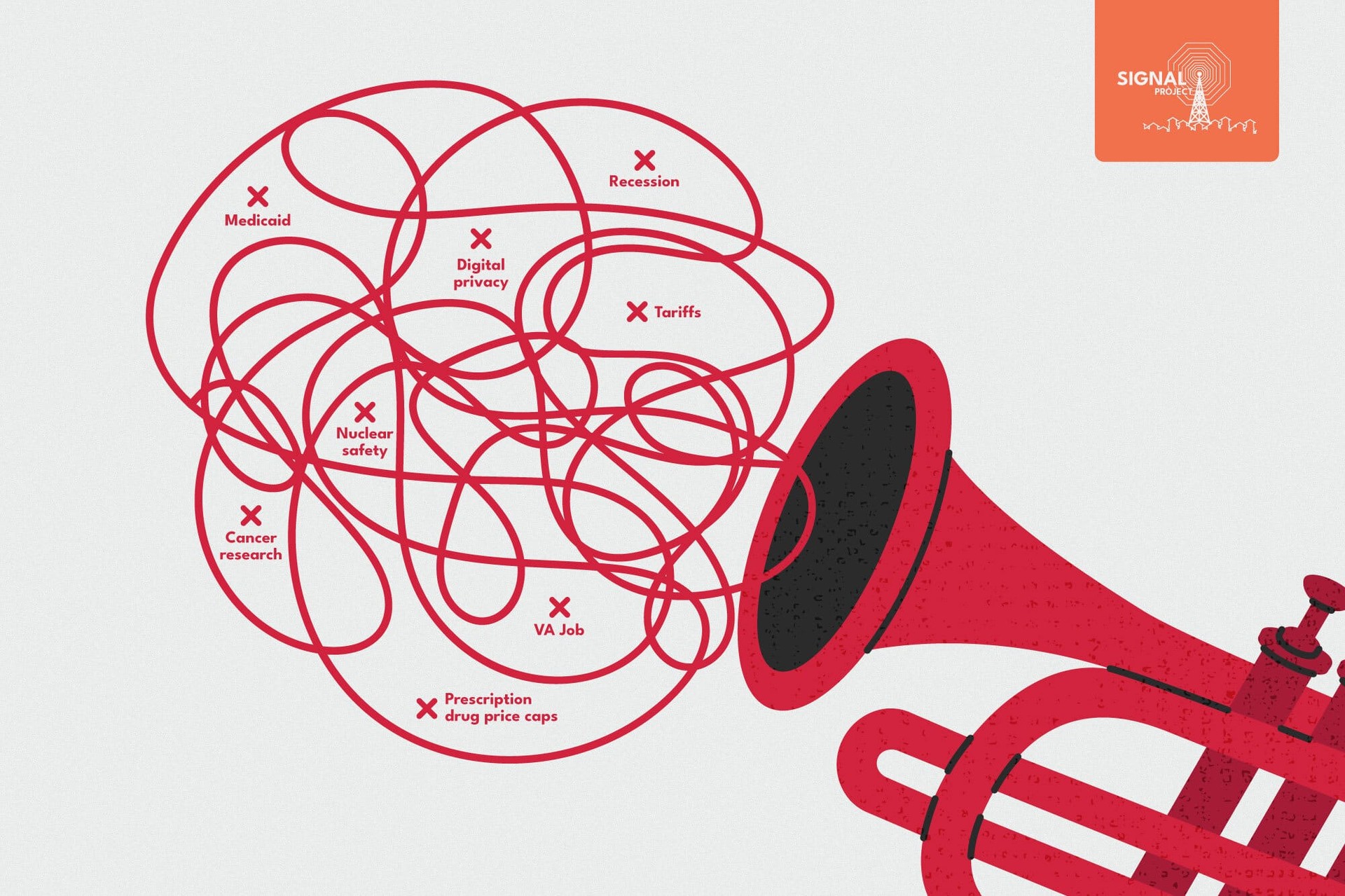Memo Published April 10, 2025 · 10 minute read
Breaking Through the Noise on Trump’s Chaotic First Two Months
Jim Kessler & David de la Fuente

Chaotic, worse than expected, incompetent. Voters are rattled by President Donald Trump’s first months in office. Despite his approval rating holding steady in the initial ask, many that approve of Trump are skeptical over his opening actions and said they didn’t approve of his performance after hearing messaging that focuses on their daily lives like the economy, health care, tariffs, and privacy.
Third Way with GBAO conducted an online survey of 2,000 registered voters from March 17 to 23, 2025. Our goal of the survey was to separate the signal from the noise in what has been a chaotic news environment in Trump’s first several months in office. This poll set out to understand which of Trump’s actions were most salient with voters and what specific messages were most effective in moving Trump supporters, Independents, and non-college voters—a set of voters that can overlap. To see some highlights and charts from the poll, view the accompanying slide deck.
Here are our key takeaways:
- Voters’ pessimism is increasing, particularly on the economy.
- Roughly 14% of 2024 Trump voters are soft and movable.
- Trump is most vulnerable on breaking his promises on costs and the state of the economy for the middle class.
- A defense of government programs must focus on specific, popular items like cancer research, veterans’ programs, Social Security benefits and staffing, nuclear energy safety, and other tangibles.
- Elon Musk is box office poison.
- Digital privacy and giving Musk and DOGE access to government data is a possible sleeper issue.
Our survey was conducted before Trump’s April 2nd tariff announcement and the initial negative market reaction. Tariffs already had high salience in our poll; we expect that salience has grown. We would recommend those looking at future research on this topic look at what worked in this poll and incorporate it, knowing that it will undoubtably poll higher in April than it did in March.
The Mood: Increasingly Pessimistic and Skeptical
Voters were pessimistic in November 2024, which contributed to Trump’s victory. This pessimism persists today. When asked if “things in the United States are going in the right direction, or do you feel things have gotten pretty seriously off on the wrong track,” by a 57-43% margin, voters said things were on the wrong track. It was -33 points among independents and -11 points among non-college voters of all races and genders. Remarkably, even 22% of Trump voters felt things were on the wrong track.
Donald Trump’s ratings remain respectable given his historic unpopularity but are already underwater—a rarity among recently inaugurated presidents. Trump’s favorable/unfavorable is 48-51%. Among independents, his favorability stands at -15 points, or 41-56%. His job approval rating is nearly identical, a 48-50% approve/disapprove among all voters; 42-56% among Independents. Among non-college voters, Trump’s approval rating stands at a barely positive 52%.
When asked about the first months of Trump’s presidency, a 40% plurality say Trump has performed worse than expected, compared to 30% who said he has performed better than expected. Among Independents, the better/worse/same ratio was 24-42-32%. One-in-ten Trump voters said he has performed worse than their expectations, with the better/worse/same ratio at 57-9-32%.
Voters’ souring mood toward Trump could be attributed to one word: chaos. When asked if certain words or phrases accurately described Trump, “chaotic” handily topped the list with 62% of voters saying it adequately described him. There is still a reservoir of support for Trump, and a majority of voters describe him as “strong” (56%) and “patriotic” (54%). Trump did not score favorably in any other positive category. Voters were evenly split on whether “incompetent” described Trump well, but in a potentially worrying sign, 11% of Trump voters said it described him very or somewhat well.
Trump’s 2024 campaign was premised on the question of which candidate would provide order and which would bring chaos. Now, Trump is clearly viewed as chaotic, thanks to his bizarre and haphazard approaches to both the economy and fixing government.
As the recent Wisconsin judge race showed, Elon Musk is unliked and is a drag on Trump. Musk has a -16 net favorable rating among all voters. Twenty percent of Trump voters now hold a negative view of Musk, compared to 12% for JD Vance and 7% for Donald Trump.
Musk’s unfavorability has bled into the Department of Government Efficiency, or DOGE, which is unpopular with 39% of voters viewing it favorably to 50% who view it unfavorably. Normally, government reform efforts are popular, but the chaotic nature of the reforms, some of the incompetence in the implementation, and Elon Musk’s outsized association with this effort, we surmise has led to making this a broad public relations failure.
Trump’s Early Actions Are Mostly Unpopular
Many, but not all, of Trump’s early executive actions are unpopular.
Before a dive into what is unpopular, it is important to understand what voters haven’t soured on. The mass deportation of 11 million undocumented immigrants appears to be the single most popular thing Trump has done so far. That has the approval of 54% of voters to 43% who disapprove. Of the 20 messages tested, it was the only one with net positive approval and cleared that threshold by enough to be more popular than Trump himself by several percentage points. Trump’s own voters wildly approve of the deportations with 87% saying they approve.
The executive orders we tested on transgender people (erasing all mentions of transgender people from federal documents) and banning DEI programs in government and encouraging the same for the private sector were both moderately unpopular. This likely reflected some of the same problems the Biden Administration had on both issues: voters want Washington to focus on things of greater importance to them and a belief that both parties listen to the ideological extremes on these matters.
The early Trump actions that score as most unpopular either hit close to home for voters or fail a morality or competency test. These are the messages that are breaking through to voters as things they either have heard about and don’t like, or if they hear more about, it will turn them against Trump.
- Cutting cancer research funding is -66 among all voters, -80 among Independents, and -77 among voters who shift towards disapproval over the course of the survey.
- Medicaid cuts are -44 among all voters, -56 with Independents, and only +4 with Trump voters.
- Cutting jobs from VA hospitals and freezing funding for veterans' health care facilities is -51 among all voters but were especially unpopular with non-college voters at -57, which was one of the few things tested less popular with non-college voter than voters as a whole.
- Cutting taxes for billionaires and corporations is -40 with all voters, -51 with Independents, though +10 with Trump voters.
- Removing price caps on prescription drugs is -37 with all voters, -50 with Independents, and only +5 with Trump voters.
- Tariffs are -22 with all voters, -36 with Independents, though +45 with Trump voters (poll taken before April 2nd).
- Spending cuts aimed at funding for things like cancer research (-66), veterans’ health (-51), and nuclear safety (-43) scored poorly for Trump.
- Independents were especially concerned with firing nuclear national security specialists who kept radioactive materials contained so they didn't explode or leak and viewed that as 21 points more negative than all voters.
- And finally, anything that seemed associated with or benefited Elon Musk was unpopular. Musk’s access to personal federal records was particularly disliked by Independents (-49), as well as measures that seemed to help Musk’s businesses and hurt his competitors (-60).
The Top Messages to Move Trump-Sympathetic Voters
Just because something is unpopular doesn’t mean it will break through with voters.
We tested 17 unique messages, paying particular attention to how salient they were in moving Independents, non-college voters, and those who voted for Trump in 2024. Each of the top four messages hit close to home: two on the economy, one on safety, and one on data privacy, which may be a sleeper issue for Independents and soft Trump supporters.
Overall, what appeared to work was the notion that Trump broke his promise to focus on the economy. Voters feel that right now, he has the wrong priorities, and his chaotic choices are making them poorer and more vulnerable to disease and disaster.
By far, the top message centered on prices and the economy:
“Trump promised he would lower prices and cut taxes for ordinary Americans, but his policies are leading to rising prices and plummeting retirement accounts, and they risk pushing the US into a recession.”
This message tested best overall and was most persuasive with 2024 Trump voters, independents, non-college voters, and voters who shifted towards viewing Trump more unfavorably during the course of the survey.
The second-best testing message was on safety:
“Trump is firing highly skilled government employees who keep us safe from diseases, nuclear accidents, and natural disasters. American families will be left sicker, weaker, and more vulnerable when the next disaster strikes.”
It was the second most persuasive message among those whose opinions shifted more unfavorably toward Trump during the course of the survey.
The third-best testing message hit on digital privacy:
“With Trump's support, Elon Musk has broken all government privacy rules and has scoured our personal data, including every person's IRS records, Social Security benefits, and health records through Medicare and Medicaid, putting all of our personal private data in his hands and at risk.”
Non-college voters (second) and Independents (third) found this most persuasive.
And the fourth-best testing message focused on tariffs:
“Trump's unpredictable actions on tariffs are already hurting the economy. Businesses are pulling back from hiring, prices keep rising, stock markets are declining, and millions of Americans' retirement security is at risk.”
This ranked number two among Trump voters and third among voters who soured on Trump over the course of the survey. Tariffs have likely risen in salience since the survey was taken.
None of the other 13 messages came close to the top four: bullying, lack of empathy, being erratic, Greenland, angering allies, enriching himself and billionaires, punishing his enemies, etc. all failed the persuasion test. It should be noted that the poll found that attacking Trump on giving tax cuts to billionaires and corporations tested strongly in the issue battery above, but Trump enriching himself and his billionaire supporters didn’t poll as well in the MaxDiff exercise, which is an important distinction.
Conclusion
Democrats have a historic and almost unprecedented opportunity to flip what appeared to be Trump’s strongest selling point into his chief liability on all things economic if Democrats separate the signal from the noise, use the right messages, avoid the wrong ones, and are relentless.
By the end of the survey, Trump’s job approval went from -2 to -13. As expected, all of that was losing people who either voted for Trump or were sympathetic to him. The groups that moved the most were younger people, non-college voters, and women. The Trump Administration creates a lot of noise, but the economy, costs, tariffs, safety, and digital privacy cut through the clutter. And again, this poll was conducted before Trump’s April 2nd tariff policies were announced, so tariffs are probably even more salient and unpopular today than when this poll was conducted.
The economy once was Trump’s superpower. Voters accepted his antics to get a better standard of living and a more secure border. Now the economy is becoming his kryptonite if Democrats deploy their messages right.


